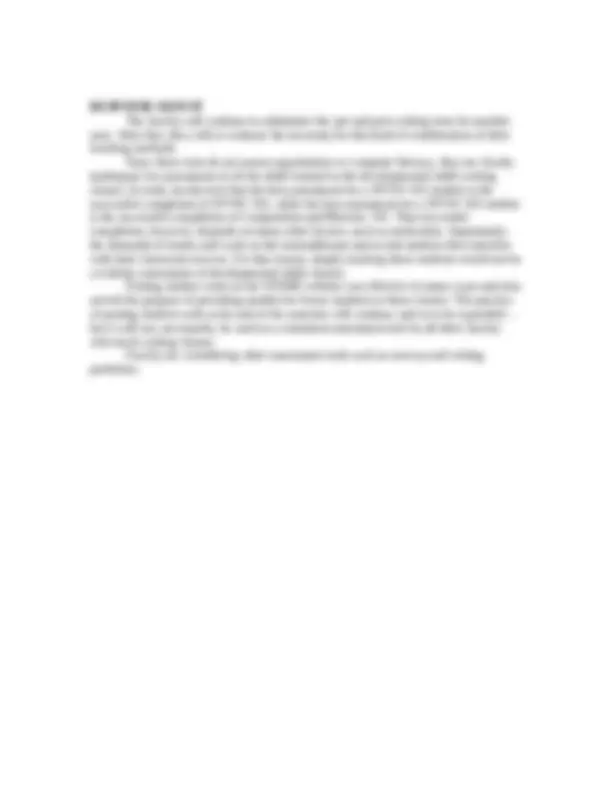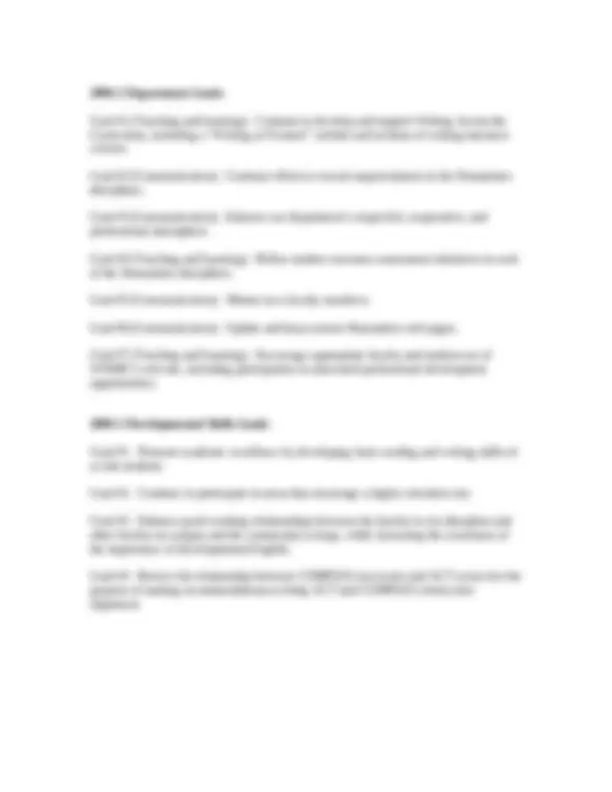




Study with the several resources on Docsity

Earn points by helping other students or get them with a premium plan


Prepare for your exams
Study with the several resources on Docsity

Earn points to download
Earn points by helping other students or get them with a premium plan
Community
Ask the community for help and clear up your study doubts
Discover the best universities in your country according to Docsity users
Free resources
Download our free guides on studying techniques, anxiety management strategies, and thesis advice from Docsity tutors
An assessment report on the developmental skills program at western michigan university, focusing on writing classes dvws 101 and dvsw 102. The report includes the major goals of the discipline, assessment strategies used, data on student progress, analysis of the results, and response/adjustments. The document also mentions departmental goals for the 2004-2005 academic year.
Typology: Exams
1 / 4

This page cannot be seen from the preview
Don't miss anything!



2005 Assessment Report Developmental Skills PLANNING The major goals of our discipline are to promote academic excellence by developing the basic reading and writing skills of at-risk students, to continue to participate in areas that encourage a higher retention rate, and to enhance good working relationships between the faculty in our discipline and other faculty on campus and the community at large, while increasing the awareness of the importance of developmental English. These goals relate to university goals, especially in terms of encouraging academic excellence and cultural diversity, as well as the theme of retention. Throughout the 1980s and much of the 1990s, the developmental skills program was its own department. At that time, the faculty used a number of assessment strategies. These included in-house pre and post writing tests, national pre and post reading tests, the use of writing portfolios, and the use of a national writing service to evaluate our student work. Predictably, these assessment tools showed that students did improve in reading and writing skills after completing our courses. When the developmental skills faculty joined the Humanities Department, our understanding was that assessment was no longer necessary within our discipline since we do not offer a major or minor in this program but feed directly into well-evaluated systems such as Composition and Rhetoric 101 and 102 classes. Faculty members Sharman Russell, Janet Wallet-Ortiz, and Sandra Griffin continued, of course, to evaluate the success of their own teaching methods in the classroom through a variety of techniques such as end-of-the-year surveys, presentations, journals, and portfolios. In the fall of 2004, the discipline resumed more official and standardized assessment measures. Developmental writing classes, both DVWS 101 and DVSW 102, gave in-house pre and post tests that covered the basic grammar skills taught in these classes. For Developmental Writing I, this includes fragments, run-ons, subject-verb agreement, pronoun agreement and pronoun usage, capitalization, apostrophes, commas, and quotation marks. For Developmental Writing II, this includes fragments, run-ons, subject- verb agreement, pronoun agreement and pronoun usage, dangling and misplaced modifiers, parallelism, capitalization, apostrophes, commas, quotation marks, and other punctuation marks. These tests were only administered in classes taught by full-time faculty. To further evaluate student progress, Sharman Russell had her developmental skills students post a paper on the Writing at Western website at the end of the fall semester. This was a pilot program to see if this kind of finished product can serve as an assessment tool. This project corresponded, as well, with departmental goals that included a greater use of the WNMU website. Sandra Griffin also experimented with a national reading test in one Reading 102 class.
In the fall of 2004, three DVSW 101 classes were given grammar tests. One DVSW 101 class had an average class score of 66% in the pre-test, with an average class score of 77% in the post-test. A second DVSW 101 had an average class score of 65% in the pre-test, with an average class score of 70.6 % in the post test. A third DVSW 101 class had an average class score of 67% in the pre-test, with an average class score of 72 % in the post-test. Two DVSW 102 classes were given pre and post tests (different from those given to DVSW 101). One had an average class score of 61% in the pre-test, with an average class score of 72 % in the post-test. One had an average class core of 62% in the pretest, with an average class score of 75% in the post-test. For purposes of comparison, a Composition and Rhetoric 101 class was also given the pre-test and scored a class average of 72%. This verifies that the test is a fairly accurate measurement of what a student should know and usually does know on entering a Composition and Rhetoric 101 class—the sequential class that follows DVSW 102. Importantly, the scores of the DVSW 102 classes at the end of the semester were also at or above this average. Patterns for the spring were similar. In one DVSW 101 class, the average rose from 62% to 73.7%. In another DVSW 101 class, the average rose from 68% to 78%. In one DVSW 102, the average rose from 66.8% to 74.3%. In another DVSW 102 class, the average rose from 67% to 73%. For comparison, a Composition and Rhetoric 101 class was given the pre-test and scored an average of 70%. We should note that this in- house grammar test is not particularly easy, even for students entering Composition and Rhetoric 101. In Sandra Griffin’s Reading 102 class, the pre test of 56% rose to 63% in the post- test. ANALYSIS Faculty teaching developmental writing skills feel that most of their students increase their knowledge of Standard English and leave these classes with grammar skills comparable to most of the students entering Composition and Rhetoric 101. It should be noted, however, that these grammar skills are only part of the skill set needed by a writer. A basic understanding of grammar in a multiple-choice test does not necessarily translate into an organized paper written in Standard English. Students in developmental writing classes must also learn study habits, pre-writing skills, computer skills, paragraphing skills, and strategies for organizing a paper. The pilot program of posting a finished product on a WNMU website seemed to be more appropriate and successful in that it demonstrated each student’s achievement as a writer. Students could access their paper in a public venue and were usually excited and proud of their accomplishment. This assessment is somewhat labor intensive in terms of gathering the papers and necessary permission slips and then arranging for their posting by the WNMU webmaster.
2004-5 Department Goals: Goal #1 (Teaching and learning): Continue to develop and support Writing Across the Curriculum, including a “Writing at Western” website and sections of writing intensive courses. Goal #2 (Communication): Continue efforts to recruit majors/minors in the Humanities disciplines. Goal #3 (Communication): Enhance our department’s respectful, cooperative, and professional atmosphere. Goal #4 (Teaching and learning): Refine student outcomes assessment initiatives in each of the Humanities disciplines. Goal #5 (Communication): Mentor new faculty members. Goal #6 (Communication): Update and keep current Humanities web pages. Goal #7 (Teaching and learning): Encourage appropriate faculty and student use of WNMU’s web site, including participation in associated professional development opportunities. 2004-5 Developmental Skills Goals: Goal #1: Promote academic excellence by developing basic reading and writing skills of at risk students. Goal #2: Continue to participate in areas that encourage a higher retention rate. Goal #3: Enhance good working relationships between the faculty in our discipline and other faculty on campus and the community at large, while increasing the awareness of the importance of developmental English. Goal #4: Review the relationship between COMPASS test scores and ACT scores for the purpose of making recommendations to bring ACT and COMPASS criteria into alignment.